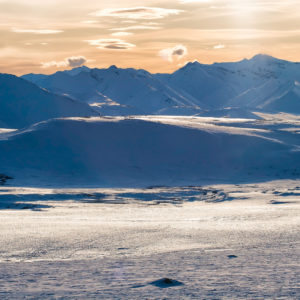Biden Leaves Local Tribe Out of Loop on Alaska Energy Lease Repeals

When the Biden administration in early September cited its “recognition of the Indigenous Knowledge of the original stewards of this area” in announcing the repeal of seven oil and gas leases on the North Slope of Alaska, it failed to mention that federal regulators did not consult with the Native Alaskans most directly affected.
Morrie Lemen, executive director of the Inupiat Community of the Arctic Slope (ICAS), said the leaders of his tribe weren’t informed of the administration’s decision until hours before it was announced by the Department of Interior, even though the Inupiat are the one tribal group who inhabit the land in question.
Moreover, the Inupiat are mandated by a previous executive order to be consulted by Interior about oil and gas leasing issues that affect the North Slope Burrough.
“When the ruling came down, we were contacted by Bureau of Land Management at the eleventh hour, about 45 minutes before the news came down they were canceling the permits,” Lemen said. “It took us by surprise. They said they contacted us for consultation, but they didn’t. We just wish the federal government would be more in tune with the rules.”
Making an end-run around the Inupiat’s opposition to the seven lease cancellations, Interior elicited contrary public statements of support from the Gwichʼin tribe, who don’t live in the North Slope Burrough that’s affected by the lease cancellations.
The Gwich’in inhabit a territory south of the Inupiat and 43 miles from the North Slope coast. Still, the tribe’s statement of support for the lease cancellations gave Interior the cover to sprinkle its announcement with phrases about honoring the traditions of Alaska Natives writ large, “who have relied on the land, water and wildlife to support their way of life for thousands of years.”
Lemen’s tribe of 13,500 people, who live in eight villages near or inside the Arctic Circle, rely heavily on oil and gas revenues to sustain themselves in a frigid climate, where buildings are difficult and expensive to erect, and keeping warm is a matter of life and death. They are a traditional subsistence hunting and fishing culture that depends upon the health of their natural environment, its fisheries, and wild game.
Revenues from oil and gas leases support the Inupiat villages’ basic infrastructure, including schools, medical facilities and public housing. Still, there is a shortage of residential building stock, and many families are forced to live with three generations crowded into small apartments, Lemen said. Without oil and gas revenues and related job opportunities, the Inupiat’s subsistence economy would collapse, he added.
“Fifty years ago, we didn’t even have running water,” Lemen said. “We’ve jumped into the 21st century at light speed and gone from no running water to electricity, but we wouldn’t support any development if we thought it would harm the environment. The oceans and lands are critical to our way of life.”
“We’ve co-existed with oil and gas drilling for five decades now, and it hasn’t spoiled any pristine landscapes,” Lemen said. “You can see caribou walking unbothered along pipelines. We wouldn’t support development if we thought it might damage our environment. The oceans and lands are critical to us. There are extreme drilling permit regulations in place to protect life here.”
Sens. Lisa Murkowski and Dan Sullivan, both Republicans, and Rep. Mary Peltola, a Democrat, declared opposition to “two Alaska new anti-development decisions,” including “canceling the lawfully awarded leases to the Alaska Industrial Development and Export Authority,” and Interior’s proposal to withdraw millions of acres within the National Petroleum Reserve-Alaska.
“Both moves are in direct contravention to Alaska-specific laws, lack scientific backing or consultation with Alaska Native stakeholders, tribes, and communities, and come at the worst possible time, geopolitically,” the joint release stated.
“Not only is this an affront to the rule of law, it’s also a grave injustice to the Inupiat people of the North Slope, especially the people of Kaktovik — the only village in ANWR,” Sullivan said. “As evidenced by this and so many of the administration’s actions negatively impacting the Alaska Native people, the idea of ‘equity’ is being exploited as a hollow political soundbite.”



